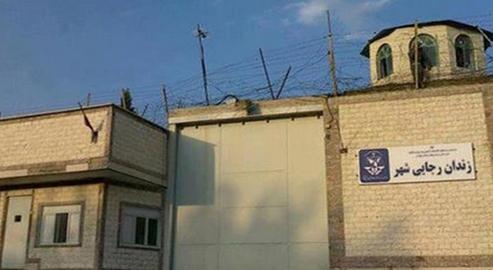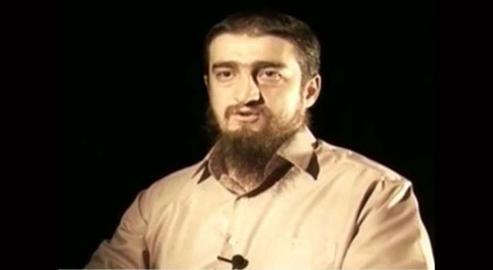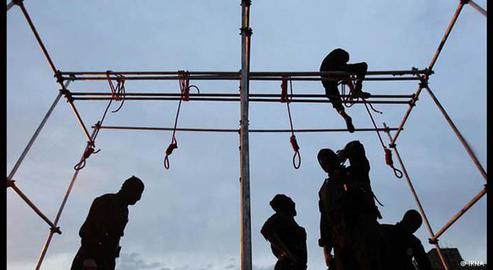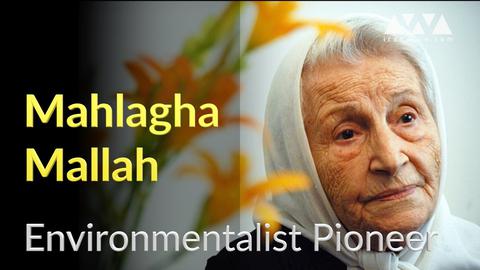- The prison has carried out a string of executions of alleged Salafists
- The executions have taken place despite laws that say death penalties cannot be carried out before an appeals verdict has been reached
- Inmates say the killings are unpredictable, but that they expect more executions in the coming weeks
- Guards regularly intimidate inmates, and are armed with batons and Tasers
- Some prisoners believe Iranian authorities want to send a strong message ISIS, and any fighters viewing Iran as a safe haven
The atmosphere was heavy and feverish, and the inmates were split into roughly three groups. First, there were those who had withdrawn into themselves and did not talk to anyone. They stayed on their bunks for hours, staring at the ceiling. Then there were a few who talked among themselves, discussing what had been going on. The rest of the inmates were like ghosts. They looked as if they had been through a great deal. They were the ones who had been issued a death sentence. Even if the appeals court had not yet confirmed their verdict, these prisoners wandered around, terrified.
One of them, Hamid, said he had appealed against his sentence. But he also told his mother that there was no rhyme or reason to the sentence, meaning he did not really know what would happen. “They executed [Kurdish prisoner] Shahram Ahmadi who was only sentenced to 10 years in prison, without any new trial,” he said. “Who knows? Maybe one night when they can’t get to sleep they will come and take us out for execution.”
On August 9, political prisoner Mohammad Abdollahi and five others were hanged in the West Azarbaijan capital of Urmia — the latest in a series of executions taking place on Ward 10 of Rajaei Shahr Prison in Karaj near Tehran. On August 2, it was reported that at least 10 alleged Salafists had been executed at the prison.
On August 3, Iran’s Intelligence Ministry implicitly confirmed the news through a statement that listed the prisoners’ crimes and terrorist acts, though it stopped short of naming the people executed. According to the statements, the prisoners were members of the militant Salafist group Tawhid and Jihad.
Some of those who faced execution at Ward 10 had been in the middle of their appeals process. According the Islamic Republic’s own laws, carrying out a sentence before an appeals court verdict is reached is illegal.
An inmate named Keyvan remembered one evening when he heard the sound of adhesive tape being torn. “We guessed that they were taping their lips, their hands and their feet,” he said. “There was absolute silence in other wards. Nobody went to sleep. We had serious differences in our beliefs, but still we were very much afraid for them.”
Inmates at adjoining wards tried to find out what was going on, listening through their cell doors. “We knew that they were taking them for execution,” Keyvan said, “because the moment we finished our lunch, there came the announcement of an emergency situation. We heard that only three people were left at Ward 10. The guys said that even Kaveh Sharifi, who had been hospitalized a week earlier after a heart attack and was in a bad condition, had been transferred to solitary confinement to be executed.”
Keyvan said he had heard rumors that more executions are on the way. “Yesterday, when I went to the visiting hall to meet with my family, other inmates told me that they had informed the families of four prisoners sentenced to death for murder to come for a last visit. They have been either executed by now or will be hanged in the next couple of days.”
Executions have been taking place in other Iranian cities too. Three people were executed in Gilan’s provincial capital Rasht, one for murder and two for carrying 15 kilos of drugs. Four people were executed in Taybad in the northwestern province of Razavi Khorasan and in Salmas and Khoy in West Azarbaijan, three in Saghez in Iranian Kurdistan and two in Qazvin.
Although alarming, the high numbers of executions are not without precedent. Iran routinely comes second to China in rankings for the total number of people executed, though not when it comes to per capita figures. For example, from December 20, 2010 to January 19, 2011, more than 97 people were executed in Iran.
“With at least 230 executions since January 1, Iran is yet again the regional leader in executions,” said Sarah Leah Whitson, Middle East director at Human Rights Watch, responding to the recent executions at Rajaei Shahr Ward 10.
The Smell of Death
Mohsen, an inmate at Ward 4, said that at Rajaei Shahr, the smell of death is everywhere. “After we heard the footsteps of soldiers marching up it took them about half an hour to come back,” he said. “I was watching through the peephole. They had taped over their mouths so they could not shout ‘God is great!’ Sometimes when they take the inmates from solitary confinement to hang, the prisoners start shouting that. Guards did not want other prisoners to hear them.”
For the prisoners in cells close to Ward 10 it must have been a very trying time. “We had no dealings with the guys at Ward 10,” said one. He explained that the guards had discriminated against him because he is a Christian — but that they also ignored Muslims on the ward. As for the Salafists who had recently been executed, he described them as seemingly “peaceful and gentle” people. “They did not in any way looked violent,” he said.
For the remaining prisoners at Rajaei Shahr, the next day was difficult to endure. The soldiers had terrified them. They had entered the ward fully equipped with helmets, batons, Tasers and masks, making a lot of noise. For the inmates, the silence in the adjoining wards was as deep as the sound of soldiers’ boots was loud. “They were not there only for executions,” Mohsen said. “They wanted to intimidate us too. It was a show of force to make us believe that they could crush us any moment that they wished.”
I asked Mohsen about how ordinary prisoners had reacted to the executions. “My cellmates and I talked about it,” he told me. “They say that ISIS is losing the war in Iraq and Syria and the Islamic Republic is afraid that Iran might turn into a safe corridor for ISIS members. So they are sending a forceful message to ISIS with these executions.”
But, he added, “everybody here is silent and sad — especially Baha’i prisoners who are more sensitive to executions.”
visit the accountability section
In this section of Iran Wire, you can contact the officials and launch your campaign for various problems


























comments